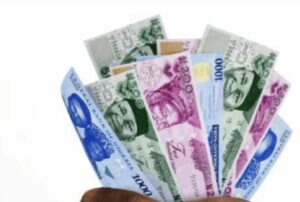Why the Naira Is Strengthening and How Long It May Last
Why the Naira Is Strengthening and How Long It May Last

The Nigerian naira has experienced consistent gains recently, following the launch of the Electronic Foreign Exchange Matching System (EFEMS) and the successful Eurobond sales earlier this week.
According to data from the Central Bank of Nigeria (CBN), the naira appreciated to N1,608/$1 on Wednesday, up from N1,625/$1 on Tuesday and N1,660 on Monday in the Nigerian Foreign Exchange Market (NFEM).
Experts predict that this trend may continue through early next year.
An anonymous source explained that the recent improvement in the naira’s value is largely due to increased transparency in the foreign exchange market, thanks to the EFEMS platform. This transparency has helped restore confidence, as it revealed that banks had a greater supply of dollars than initially perceived before the system’s introduction.
The CBN introduced the EFEMS platform on Monday as a measure to curb speculation and increase transparency in the FX market. The system automatically matches buy and sell orders, promoting fairness and efficiency in trading. Financial analysts are optimistic that EFEMS will help address long-standing issues with the naira and Nigeria’s foreign reserves.
The EFEMS platform allows licensed dealers, including commercial banks, to submit buy and sell orders in real-time. These transactions are matched based on pre-set rules, providing market participants and regulators with instant visibility and ensuring quick, seamless execution.
Gbolohan Ologunro, a portfolio manager at FBNQuest, pointed out that recent dollar inflows have been bolstered by increased activity from Foreign Portfolio Investors (FPIs), who are attracted by high yields on one-year treasury bills. These yields have hit record levels in recent auctions, peaking at 30.71% before easing to 29.75% in the latest one.
At the most recent treasury bill auction, the one-year NT-bills saw the highest bid of the year, totaling approximately N2.53 trillion.
Uduak Jacob, a portfolio manager at Comercio Partner Asset Management, also highlighted that FPIs have been flooding the market with dollars, anticipating the upcoming Open Market Operations (OMO) auction. Some even participated in the NTB auction.
Yields at recent OMO auctions have reached record highs of 32%.
Ologunro added that the combination of high yields and the EFEMS system’s enhanced transparency has helped boost investor confidence. “If the platform continues to function effectively and yields remain at these levels into next year, FPIs will likely continue to hold naira-denominated assets, which will support ongoing dollar inflows,” he said.
“These inflows will be further strengthened by the sales from the Eurobond issuance expected in January, which could boost Nigeria’s foreign reserves to around $45 billion, sustaining the naira’s appreciation into February,” Ologunro added.
In a related development, Nigeria returned to the international bond market on Monday, raising $2.2 billion through the sale of Eurobonds. The issuance was oversubscribed, attracting $9.1 billion in demand.
The Federal Government sold $700 million worth of 6.5-year Eurobonds maturing in 2031 at a coupon rate of 9.625%, and $1.5 billion in 10-year bonds at 10.375%.
Analysts at CSL Stockbrokers have noted that the proceeds from the Eurobond sale, expected to flow into Nigeria’s foreign reserves by December 9, 2024, could raise the reserves to over $42 billion by the end of the year.
“This increase in reserves could enhance the Central Bank of Nigeria’s ability to support the naira in the near-to-medium term, possibly leading to a further modest appreciation of the currency,” the analysts concluded.
TRENDING SONGS
 Shock in Anambra: Bride Disappears Moments Before Wedding
Shock in Anambra: Bride Disappears Moments Before Wedding
 Nigerian Woman Returns ₦330 Million Accidentally Credited to Her Account
Nigerian Woman Returns ₦330 Million Accidentally Credited to Her Account
 APC Don Reach Morocco?’ VeryDarkMan Reacts to Seyi Tinubu Poster
APC Don Reach Morocco?’ VeryDarkMan Reacts to Seyi Tinubu Poster
 Bride Breaks Down in Tears as Wedding Meals Were Kept Secretly While Guests Go Home Hungry
Bride Breaks Down in Tears as Wedding Meals Were Kept Secretly While Guests Go Home Hungry
 Odogwu by Day, Robber by Night: How Marriage Joy Turned Into Tragedy
Odogwu by Day, Robber by Night: How Marriage Joy Turned Into Tragedy
 Nigerian Officials Allegedly Pocket N4–6B Weekly Through Smuggling Cartels at Seme–Badagry Border
Nigerian Officials Allegedly Pocket N4–6B Weekly Through Smuggling Cartels at Seme–Badagry Border
 Ahmad Yerima: Naval Officer to Face No Sanctions After Clash with Wike – Matawalle
Ahmad Yerima: Naval Officer to Face No Sanctions After Clash with Wike – Matawalle
 Trending Video: Muslim Man Joins Wife in Hallelujah Challenge ‘Dress Like Your Miracle’ Night
Trending Video: Muslim Man Joins Wife in Hallelujah Challenge ‘Dress Like Your Miracle’ Night
 Woman Seeks Advice as Late Brother’s Wife Refuses to Mourn Him Following His Death With Alleged Mistress
Woman Seeks Advice as Late Brother’s Wife Refuses to Mourn Him Following His Death With Alleged Mistress
 Nobody Cares About Fine Girls In The UK, I Miss Nigeria — Nigerian Lady Laments
Nobody Cares About Fine Girls In The UK, I Miss Nigeria — Nigerian Lady Laments
Share this post with your friends on ![]()













